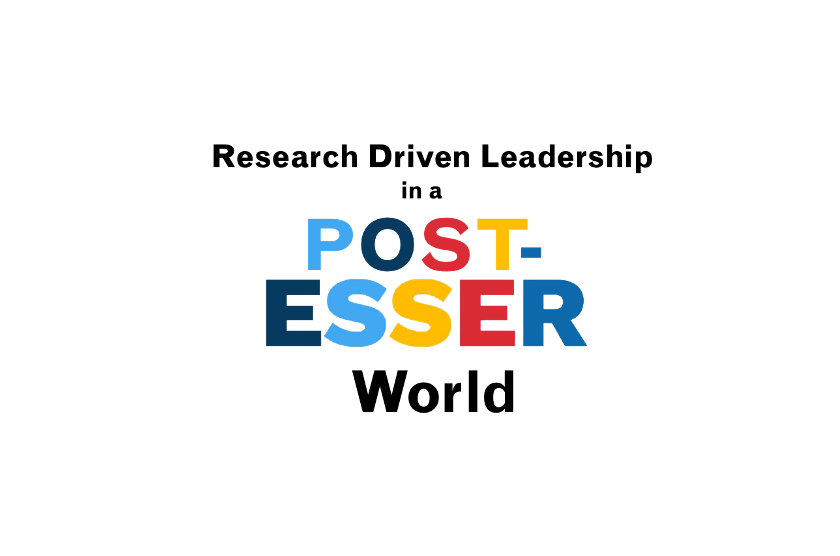How to Recruit and Retain School Counselors in Your District

Many students (including myself when I was in school) have been impacted by an amazing counselor. School counselors and psychologists are the key component for mental health in K-12 school districts. They’re responsible for advocating for students’ well-being, mediating conflicting, spearheading violence and drug prevention programs, and much more.
As I’ve been writing about teacher shortages in my Forward to Different series and podcast, counselors are not immune. Nearly 59% of school counselors leave their position after the first two years in the position. Additionally, a report published in the Administration and Policy in Mental Health and Mental Health Services Research found that 67% of mental health professionals reported experiencing high levels of burnout. Key contributors include:
- High volume of non-counseling duties
- Large caseloads
- Lack of administrative support and supervision
- General burnout (Chronic fatigue, depersonalization/compassion fatigue, and stress)
- Role ambiguity
The lack of mental health resources available to address these compounding issues continues to plague school districts. Across the country, K-12 schools don’t have enough on-site counselors and psychologists to cater to the mounting mental health needs of students.
Mental health crisis in America
When talking to teachers, counselors and school leaders, many mention that this past school year (2021-22) was much more stressful than the previous year of the pandemic. Exacerbated by COVID-19, students (and adults) have struggled with anxiety and social interactions much more than before the pandemic. Suicide rates among youth and gun violence on school campuses is at an all-time high. Furthermore, studies have shown that social distancing and remote learning mandates, while necessary at the time, yielded some unintended consequences. Post-pandemic school life has increased stress among students and strained relationships between teachers and students.
Considering these harrowing statistics, students need more mental health support than ever.
“Looking at this situation outside of the COVID-19 context makes it abundantly clear just how vulnerable this profession already was to attrition, but taking COVID-19 into consideration as well as virtual learning and the mental health crisis that has ensued among young people, school counselors have found themselves in impossible working conditions,” says Teodora Pavkovic, lead psychologist and cyber safety expert at Linewize.
The American School Counselor Association (ASCA) recommends a student counselor to student ratio of 1:250. However, only 14 percent of schools met this criteria during the first full year of the pandemic in 2020.
The current average national ratio is one school counselor for every 415 students — but in some schools, the ratio is much higher..
Problems school counselors face
According to the American Counseling Association’s ethical standards, school counselors “have an ethical responsibility to monitor their feelings of burnout and remediate when their feelings potentially influence their ability to provide quality services to their stakeholders.”
School counselors are responsible for maintaining their physical and emotional health to ensure quality care. When a counselor’s well-being is neglected, their ability to help students is compromised. I recently keynoted an event for school counselors in Texas and discussed some of the every day stresses they face and the impact the stress has on those they serve. Below are some of the most common causes of counselor stress.
High caseload
The national student to counselor ratio far exceeds the recommended 250:1. Large caseloads make it difficult to remember student names, build rapport, and earn trust. Furthermore, high caseloads can quickly lead to heightened stress levels and stronger feelings of depersonalization.
This creates a domino effect of complications. A higher number of students increases the risk of missing a student in crisis. As a result, students who lack access to sufficient mental health support will continue to suffer in silence. And, without resources to guide them, their struggles can negatively impact academic performance, behavior, and social awareness.
Lack of administrative support and supervision
School counselors are uniquely positioned to gauge the wellbeing of the student body. However, it’s not uncommon for counselors to struggle to implement changes as they are largely viewed as “support” positions in many schools rather than the leaders they are. Counselors need the support and supervision of principals and other administrative officials in order to develop programs and practices that address the challenges they observe. Without a clear, open communication channel, progressive changes are difficult to make.
Role ambiguity
According to Elementary School Guidance & Counseling, “School counselors experience role ambiguity when their responsibilities or the expected level of performance is not clearly identified.”
School counselors and school psychologists are motivated by the prospect of having a positive impact on their students and environment. Yet, despite the clear role statements set by the ASCA, school counselors frequently find themselves in organizational systems where roles and responsibilities don’t align with the counselor’s training or ethics.
“More needs to be done to help clarify the role of the school counselor, whose job description currently encompasses too wide and vague a scope, including student’s academic, social and personal needs and outcomes,” says Pavkovic.
How to recruit high-quality counselors
So we have identified the importance and impact of the role of the school counselor in a school community, but we also acknowledge the large turnover in the position. What are some strategies for school and district leaders to recruit high-quality folks in the position? Here are a few strategies that leaders have shared:
Create clear roles and responsibilities
Hiring personnel should outline clear responsibilities that fall within the American School Counselor Association’s list of acceptable duties. Create a role agreement that reinforces your commitment to ASCA-approved responsibilities.
Set collaborative goals and expectations. At a minimum, meet with your school counselor at the beginning, middle, and end of the school year to discuss those responsibilities, address any gaps, and review goal progress.
Emphasize work-life balance
School counselors tend to be overworked and overwhelmed. An unhealthy work-life routine can negatively impact counselors’ ability to help students while tending to their own mental health needs.
During the interview process, communicate the prioritization of healthy work-life balance and establish boundaries early on. This could mean mandatory mental wellness days, reinforcing acceptable tasks and “asks” for counselors, and setting defined working hours, including when to be on and off of email.
Improve your staff to student ratio
Studies have shown that lower student to staff ratios may have a positive correlation with improved test scores and higher graduation rates. A strong student to staff ratio enables school counselors to effectively support and manage the student body.
Schools that aren’t in a financial position to hire more staff (as many are) should — at the bare minimum — be transparent about future plans to improve student-to-staff ratios and address how the school will actively prevent case overload in the interim.
Partner with training programs
Many states have developed unique solutions to address the shortage of mental health staff at schools.
For example, Montana State University and the University of Montana developed the Rural Mental-Health Preparation/Practice Pathway federal grant program to prepare graduating counseling candidates to gain experience as counselors in rural communities. One of the primary objectives for the program is to increase the number of counselors in rural schools and communities and to foster quality rural mental health services in the state.
Over in California, the state senate launched its “Golden State Teacher Grant Program” to provide aspiring school counselors with $20,000 grants for a four-year commitment to working in public school districts.
State leaders should leverage policies and grants to address mental health challenges and improve the pipeline of mental health professionals in schools. There are many federal grants available to fund school counselor salaries, mental wellness program development, and professional development opportunities.
Reach out to your state educational agency to learn more about grant opportunities that support your school’s mental health efforts.
Improve workplace culture
Workplace culture has significantly impacted employee retention, productivity, creativity, and collaboration. School leaders should prioritize engagement, communicate and practice core values, and foster collaborative working relationships. Here are a few ways to improve the culture at your school:
- Launch social and emotional professional learning sessions
- Survey your staff regularly to track their wellbeing
- Share your mission state to ensure staff are aligned with values
- Always model core values
- Create opportunities for social gatherings (like a trivia night!)
- Provide access to professional learning programs outside of the district
- Check in regularly
- Show appreciation and be present
Retaining high-quality counselors
With high turnover rates for school counselors, retention should be top priority. Once you’ve hired a great school counselor, how do you keep them?
“Providing financial incentives is certainly one way of helping schools and districts hold onto their counselors, but a lot more is needed,” notes Pavkovic. “Counselors must be given more manageable workloads and have to be provided with the resources they need to help those students whose challenges surpass their level of training.”
Improve collaboration between counselors and administrators
According to the ASCA, school counselors should work alongside other educational stakeholders to create learning environments that promote educational equity for all students.
To cultivate a school culture that promotes systemic change and student success, counselors should be granted the time and resources necessary to collaborate with administrators, families, teachers, and community leaders. These collaborations help reinforce the mission of the school counseling program. Counselors should included as part of a the campus leadership team.
Avoid assigning tasks unrelated to school counselor responsibilities
While there are times when schools are short-staffed and there is an “all hands on deck” approach to counselors helping out in areas outside their job description, these shouldn’t be the norm. High volume of non-counseling duties is one of the biggest causes of burnout among counselors. These tasks include:
- Monitoring the cafeteria and halls
- Supervising students at recess / crosswalks after school
- Maintaining student records
- Performing disciplinary actions
- Preparing materials for testing,
- Acting as a 504 coordinator
“Although sometimes uncomfortable, setting boundaries is necessary in school counseling,” said TaRael Kee, a school counselor at Collinsville High School. “We are compassionate and empathetic in nature and for many of us, saying yes to increased workloads and extra duties feels easier.”
Review the list of appropriate responsibilities outlined in the ASCA National Model and conduct a regular audit of current school counselor duties.
Are there any tasks that do not require a specialized certification? Are counselors currently responsible for tasks that fall outside the scope of ASCA-approved duties? If so, delegate those responsibilities accordingly.
Assess burnout risk
Although burnout looks different for everyone, recognizing early signs can help stop it. Preventative measures may mean the difference between a long tenure and a high turnover rate.
Although counselors have a duty to protect their own mental health, as previously mentioned, they often agree to take on increased workloads and non-counselor duties in the interest of helping their colleagues and the school. These additional responsibilities can quickly result in burnout and feelings of loss of control.
School administrators should provide school counselors and other educators with tools to self-assess burnout risk, such as Educator Impact. Tools like Educator Impact enable principals to run regular wellbeing check-ins, gather feedback, and connect staff with the appropriate support resources.
Involve school counselors in decision making
Your school counselor may have several innovative ideas to improve student wellbeing based on their professional experience and observations. For example, perhaps they’d like to develop a more streamlined system for setting up appointments, create a communication procedure for dealing with parents, or have more opportunities to talk in classroom and group settings.
School counselors need adequate support in order to make a strong impact on systemic processes. They play a crucial role in the success and wellbeing of students, and their feedback and suggestions should be strongly considered during administrative decision-making.
Professional development
Continuing education is crucial for successful counseling careers, particularly in today’s tumultuous time.
“Outside of the heavily off-balance counselor-to-student ratios, many counselors also struggle to deal with their student’s mental health difficulties, such as self-harm behaviors, which they have not been trained to handle,” says Pavkovic.
School counselors and other mental health professionals need access to professional development resources that help expand their professional skills and nurture their ability to respond appropriately to sudden shifts in mental health among students.
Show appreciation
Counselors play a significant and instrumental role in schools. It doesn’t take much to show appreciation, but it goes a long way. A simple “thank you” gives school counselors the recognition they deserve and can help motivate them to remain in their position.
For example, according to the ASCA, National School Counseling Week, which takes place every February, “highlights the tremendous impact school counselors can have in helping students achieve school success and plan for a career.” While every school should participate, there are several ways you can show appreciation throughout the year:
- Say “thank you”
- Acknowledge gratitude during school announcements
- Enable your students to give certificates of appreciation
- Allow students to decorate counselor doors with positive affirmations and recognition
Financial support for mental health services in schools
Over the past several years additional federal funds have been allocated to support mental health initiatives in schools. Most notably, the Safer Communities Act was recently passed to address the mental health crisis among students in America.
The Safer Communities Act allocates billions of dollars in additional funding to support the development and implementation of student wellness and safety programs in schools. This includes offering schools the funds necessary to increase the number of diverse, highly-qualified mental health professionals on-site and provide school counselors with additional professional development support.
Conclusion
There are many reasons counselors decide to leave a school. In addition to burnout, more counselors are also leaving schools to launch independent practices. As the mental wellness space grows, it’s possible that unsatisfied school counselors are pivoting career tracks in search of job satisfaction.
Strong recruitment and active retention efforts can keep your counselors happy and your student body healthy.
“When you invest in school counselors, you’re not just investing in students’ academic achievement, mental health and college and career readiness,” said Jose Cardenas, a counselor and program specialist for the Stockton Unified district. “It’s an investment in the entire school, in families and whole communities.”
Editor’s note: This article was co-written as a partnership with Linewize.
Recommend0 recommendationsPublished in Leadership Voices





Responses